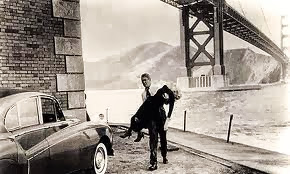TV’s Saturday Night Live has long been a proving ground for some of the top comedians who have often gone on to greater fame. Witness John Belushi (Animal House), Eddie Murphy (Beverly Hills Cop, Trading Places), Bill Murray (Ghostbusters, Stripes), Will Ferrell (Anchorman), and Tina Fey (30 Rock) among many. Certainly a few have failed in films like Deuce Bigelow, The Ladies Man, and MacGruber. Current female SNL player, Kristen Wiig, joins the ranks of the former with Bridesmaids, an occasionally gross, yet heartfelt tale of self worth and ultimately love. After numerous supporting roles in popular films like Adventureland and Whip It, she has made the big leap into stardom, and she co-wrote the screenplay too!
Annie (Wiig) is an insecure, single woman working a miserable job at a jewelry store and whose love life consists of impersonal sexual romps with a narcissistic playboy (Jon Hamm). Her dreams of a bakery having failed recently, she has horrible roommates and a doting mother (Jill Clayburgh) nearby. When her best friend, Lillian (Maya Rudolph) announces her engagement and asks her to be her bridesmaid, Annie prepares the female bridal party for gowns, showers, and the reception. When Lillian’s wealthy, ‘perfect’ friend, Helen (Rose Byrne), elbows her way for attention and begins to take over the wedding preparations, Annie becomes jealous and overdoes things in a display of one-upsmanship (or rather womanship). In a series of confrontational events, Annie sinks further into verbal ineptitude and embarrassment in front of her best friend. Along the way she gets pulled over by an Irish cop, Rhodes (Chris O’Dowd), who takes a fancy to her; what puzzles her is why any man would be nice to her? It all culminates at a pre-wedding reception where Annie unleashes her anger and frustration. Things get worse for her at work and her apartment, and as her world comes crashing down and she becomes an outsider to her best friend’s wedding, Annie’s fate takes a dramatic turn amid friendship and love.
Audiences have been well aware of Wiig’s physical and whimsical skills as a skit comedienne. What this film does is show an entirely different spectrum of her abilities as an actress and writer (with Annie Mumolo directed by Paul Feig). By playing a sympathetic character with flaws and yearnings and surrounding herself with a roster of talented actresses, Wiig has positioned herself as an every woman who has had life’s ups and downs, but mostly downs and creating such pathos that the payoff at the end is more satisfying. The scenes between Wiig and O’Dowd, who make a terrific couple, are genuine and really hold the story on a firm emotional footing. As one of Lillian’s friends, Melissa McCarthy (Mike & Molly) steals every scene she is in and provides the film with some of its funniest moments in support. Even Byrne shines as the manipulative, scheming friend while Ellie Kemper and Wendi McLendon-Covey round out the wedding party. As Annie’s mom, Clayburgh performs a sweet, final career note; this was her last film. Jon Hamm is only in a few scenes but is quite effective as a chauvinist jerk.
There are numerous funny moments. A toast to Lillian and her fiancé by Annie and Helen develops into dueling testimonials that become silly and outrageous. When Annie gets stopped by a policeman, she displays her talent for physical comedy in conducting a drunk test. A scene where she sits at her mom’s home alone watching a video of Castaway’s scene of Tom Hanks losing his ‘best friend’ Wilson is a hoot. On the plane when Annie mixes prescription medication and alcohol, she becomes obnoxiously and amusingly uninhibited, and there is a running gag with McCarthy who thinks her seat companion is really an air marshal. Bridesmaids a film that is honest and direct about its subject matter and its consenting adults, and it has moments that are crude such as the food poisoning scene at the wedding boutique and some sexual gymnastics between Wiig and Hamm.
The film is a bit uneven in places but when it hits the right notes especially towards the end, when a major character like Annie undergoes a transformation, it feels genuine and at times heartfelt, and we are the beneficiaries of something more than a pedestrian comedy. When her relationship with Lillian is threatened, Annie reacts in exaggerated, desperate behavior. She even has trouble accepting true intimacy from a good man because she has never been treated so nice. It’s really about Annie being able to connect in a meaningful way with another human being. In fact, Annie’s plight and desperation shares its DNA with Bridget Jones’s Diary.
With its predominantly female cast, this Judd Apatow (40 Year Old Virgin, Knocked Up) co-produced film delivers the laughs with feeling. Don’t think of this as just a ‘chick flick’ but rather an entertaining, contemporary comedy that contains just a bit more estrogen. And do stay for the closing credits if you want a bit of raunchy fun.
*** of **** stars (Add ½* for Wiig fans)




